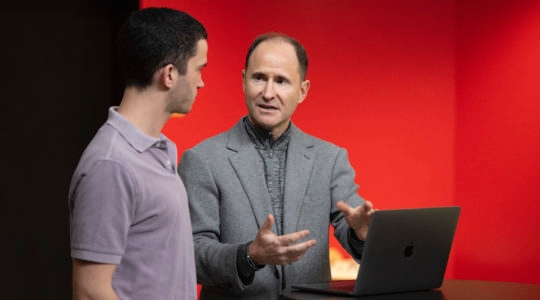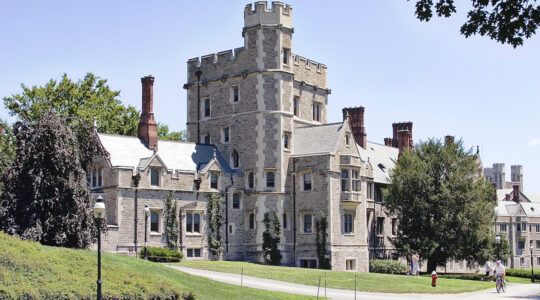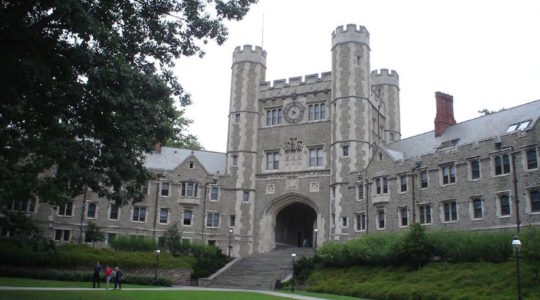Monday, The Ruderman Family Foundation officially launched a $6 million partnership with the American Jewish Joint Distribution Committee and the Israeli government to help better serve Israel’s nearly 700,000 special needs citizens.
The Ruderman family made a decision when it started six years ago to focus on the special needs community, and has spent millions of dollars in the Boston area working with the Combined Jewish Philanthropies provide better services for special needs students in 12 of the area’s Jewish day schools.
(If you got the Fundermentalist newsletter yesterday, hopefully you read about the Ruderman Family Foundation’s work with Jewish special needs education in the Boston area.)
In Israel, the foundation is trying to help a much broader spectrum of the special needs community.
The partnership — called Masad Disabilities — will unite Israel’s Ministry of Social Affairs and Social Services, Ministry of Health, Ministry of Finance, and National Insurance Institute with JDC, according to the Joint.
The group will try to create new models of service for a number of special needs populations: Parents with disabilities, people with multiple disabilities, the newly disabled, new immigrants who are disabled, young adults and aging adults.
The partnership will work to create job training, support groups, better coordination among service agencies helping the disabled population and more…
For more about the partnership, read this from the Joint.
[[READMORE]]
On September 7th in Jerusalem, the Joint Distribution Committee, the Boston-based Ruderman Family Foundation, and the Government of Israel will launch a major partnership to benefit Israel’s 697,000 disabled adults. This will be the fifth JDC-Government of Israel joint effort dedicated to bettering the lives of the country’s vulnerable populations.
The $6 million partnership — Masad Disabilities — will unite Israel’s Ministry of Social Affairs and Social Services, Ministry of Health, Ministry of Finance, and National Insurance Institute with JDC and the Ruderman Family Foundation to advance the independent living and integration of disabled populations into general Israeli society through innovative models of services; and to promote inter-ministerial cooperation and pooling inter-organizational resources to ensure the needs of the disabled are more fully met.
The Ruderman Family Foundation, under the leadership of its president Jay Ruderman, is known for its progressive work with children with special needs in Boston’s Jewish day school system. Mr. Ruderman, a recognized voice among philanthropists pioneering new partnership models and causes, has chosen to work with JDC on this project and leverage our existing partnerships in Israel — ESHEL, for the elderly; Ashalim, for children and youth at risk; TEVET, for the unemployed; and Masad Klita, for new immigrants — to maximize the success of the effort and build a viable system to support the growing needs of the ever-expanding population of disabled Israeli adults.
In addition to the partnership’s main goals, it will also address the social barriers and health-related challenges faced by the following groups within Israel’s disabled adult population (ages 18-67):
- Parents with Disabilities – 48% of all disabled adults who are eligible for government entitlements have children under the age of 18. New services likely to be developed on a national scale for this population include: specialized parental counseling, parent support groups, assistance in accessing family services, and dissemination of information.
- People with Multiple Disabilities – 43% of disabled adults who are eligible for government entitlements have more than one disability, yet they often fall through the cracks of the social services system due to lack of clarity regarding which agency is responsible for addressing their needs. New programs may include: training of professionals, formal coordination among different service agencies, and improving physical accessibility to mental health services.
- Newly Disabled Individuals – People who become disabled in the middle of their adult lives — some 10,000 individuals per year — require support services different from those available to people who were born disabled. New programs may include: vocational rehabilitation, new assistive technologies to increase autonomy, and emotional support in coping with trauma.
- Immigrants with Disabilities – Immigrants with disabilities face unique challenges, including poverty (38% of disabled immigrants live in poverty) and community stigmas which hinder the disabled from seeking treatment. New programs may include: increasing awareness among immigrants of importance of treatment, campaigns to eradicate stigmas, and translation of information on entitlements and services into their native languages.
- Young Adults – Some 7,000 young people with disabilities graduate from special education frameworks every year. New programs will be developed to prepare them for the difficult transition to independent living in the community. Programs will focus on providing specialized counseling to young adults and their families, training young adults in daily life skills, continuing education, economic self-sufficiency, and health needs.
- Aging Adults – People with disabilities suffer from "early aging," reflected in functional or health-related deterioration at an earlier age. New programs will focus on improving coordination between service agencies for the disabled and those for the elderly as well as methods of formalizing new family care.
JTA has documented Jewish history in real-time for over a century. Keep our journalism strong by joining us in supporting independent, award-winning reporting.





